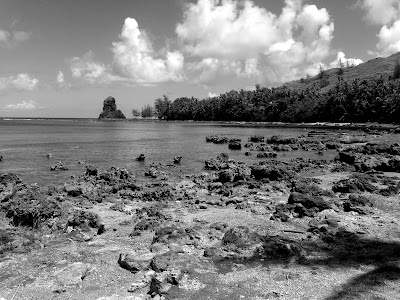Para i Finakpo', i Tinituhun
Thought it would be nice to end the year with a reference to what is considering to be the beginning of the Chamorro people, namely Fouha Bay, where most consider the Chamorro creation story to be set. Here is some information on it, placing it in both a historical and contemporary context and briefly how it connects to an upcoming project my family will be published.
*******************
Fouha Bay/Laso' Fouha
The Birthplace of Chamorro Civilization
*******************
Fouha Bay/Laso' Fouha
The Birthplace of Chamorro Civilization
There are several creation stories for Chamorros. Some deal with
Magellan getting lost, others with Marines hitting beaches, and then there are
those which imagine the beginning with snakes tempting fruit aficionados in
paradise. One creation story that is achieving more and more prominence is the
tale of Fu’una and Puntan, which is partially set in the village of Humatak,
and it is also the setting for a comic that I have been working on with my brother Jack as part of our Guam Bus creative plans.
For those unfamiliar with Puntan and Fu’una, like any story that
could be thousands of years old, you will have different versions. Most all of
these versions involve two figures: Puntan and Fu’una, a brother and a sister.
Puntan gives up his body parts in order to create the sky, the ocean, and the
island of Guam (and all the Marianas). Fu’una gives up her energy in order to
give life to the islands and create Chamorros. Fouha Bay was considered to be a
sacred place in ancient times because of its relationship to this story. A
large rock there, Laso Fu’a,
is supposed to be the body of Fu’una. Chamorros from the inhabited islands
would gather in the area each year in order to honor their ancestors, most
importantly Fu’una and Puntan.
We can sense the sacredness of the place, because even the
Spanish who came to convert Chamorros and colonize them recognized its
religious significance. This is important, because the priests were committed
to doing away with most of the religion of the ancient Chamorros, finding ways to subvert it and make it become
subordinate to the new Catholic faith. But Fouha Bay in Humatak was noted for
being a place where Chamorros from villages around the entire island and from
other islands in the Marianas would gather to recognize their shared spiritual
roots.
For hundreds of years during colonization, Chamorros no longer made pilgrimages to
Fouha Bay to honor Fu’una, but you can still trace a continuity of belief.
During the Spanish and early American periods, for example, Chamorros would
still make regular stops at Fouha Bay on their way to fiestas in the south. The
area was known to have powerful spirits. Even if people no longer told the
stories of Fu’una and Puntan, they still acknowledged the great supernatural
power of the place.
In February 2014, a group of artists and activists held a lukao
or procession to Fouha Bay in attempt to reconnect to this place and the power
it once held in Chamorro life. Those who joined the lukao brought with them
wishes for the new year, along with offerings such as rice, jewelry, or fruits, for their ancestral
spirits. A ceremony was held beneath Fouha Rock, with all present gathered in a
circle. Another lukao was held in 2015, with plans to make it an annual event,
once again.




Comments